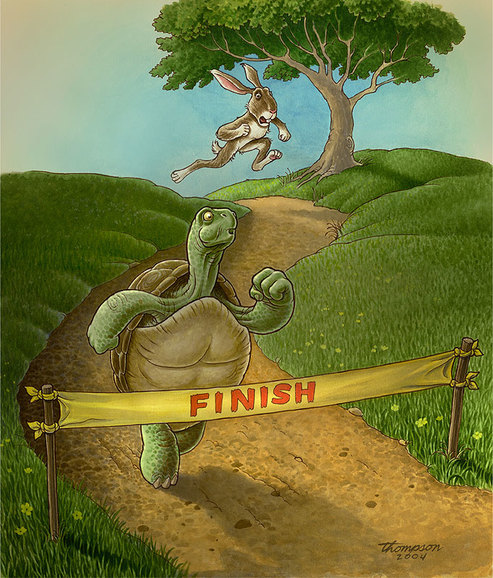|
Behavioral finance has grown as a field of study in the last few decades. There are tricks and tips on how we can change our behaviors to save and invest money. Some are pretty useful.
One thing has always worked for me, however. And that thing is fear. I often imagine the most horrible scenarios that can happen if I don't save and invest and once I'm sufficiently scared, I go and save some more. I seem to have an extreme long view of my life, much more so than other people. When I was in fifth grade, DARE used to come to my class and show us pictures of black lungs - "Kids, this is what happens if you smoke!" Or they would show us a picture of a wrecked car - "Kids, this is what happens if you drink and drive!" DARE was highly effective and their words have been stamped into my brain forever. Fear works for me but I'm not sure it works for other people. Generally speaking, you should be nice in your approach when giving advice. Having said that, I do wonder if people might take you more seriously if you say, "Here's what might happen if you don't save." (But of course, you say it super nicely). There are several interesting articles that talk about what may happen on Forbes, Huffington Post, and Reddit. Some key highlights on what happens if you don't save for retirement: 1) You will have to work until you die (hopefully, no bad health issues get in the way). 2) You give up your house and move in with your kids or other family members (hopefully, they are okay with this). 3) You will not be able to live a lifestyle that you may want to have (engaging in expensive hobbies, travel, fine dining, etc). Think about all this. And if you haven't given much thought to your financial situation, perhaps it's time to start.
Comments
I am a big fan of the reddit thread FIRE - Financial Independence, Retire Early. It is an incredibly positive thread with none of the negativity or craziness I see on other message boards.
Just to be clear, before anyone gets the wrong idea, the phrase "Retire Early" does not mean that we will quit our jobs, stay at home, and watch Judge Judy all day. It instead means that we will have enough money where we can do anything we want. Some people really love their jobs and will continue to work, some may move into a different industry, some may decide to travel, some may decide to take time off to figure out the next step they want to take in their life, etc. I have been very aggressive about finding an industry I love and I hope I will be one of those people who likes my job so much I decide to stay in it even after reaching financial independence. I read Reddit FIRE everyday and this particular thread stood out to me - "Who has been your biggest influence for FI?" My answer is: From my work with startups before business school. While I learned a tremendous amount during my time in this space, the most important thing I learned was that working at a startup is not the best financial decision, and that you are MUCH better off working for a large, stable company that pays you a steady paycheck and won't go out of business in six months, offers you great benefits (401K matching, health insurance, etc), and looks good on your resume. Although startups sound sexy and cool, the reality of the situation is that you will get paid far below market rate, your equity will most likely not be worth anything, and if you decide to move into the corporate world, you will have a much harder time doing so because recruiters won't have heard of the startup and will thus not take you seriously. Thankfully, I had the financial safety net offered by my parents the entire time. I don't want to think about what might have happened if that hadn't been there. That experience made me incredibly aggressive about saving and investing. I now prefer the "slow and steady" approach to money management. Everyone has their own approach and even though it took me a few years and several falls on my face to develop mine, I am very happy with it. For the longest time, I have had what I thought was an unusual money habit.
I look at my mint.com account to see how much money I have. Looking at that aggregated number instantly makes me feel better no matter how I am feeling about other things. I also have a spreadsheet where I track how much my net worth has grown every quarter for the last few years, ever since I began investing. It shows progress which makes me feel like I am moving forward. Interestingly enough, I have come across two other instances very recently where this exact behavior is replicated. 1) One is with Sallie Krawcheck, founder of Ellevest. I listened to her WNYC podcast and she had the following to say about this particular behavior quirk, " ... As a child, I liked to look at the savings account, okay, I've got money, there, I'm feeling calmer. I keep an Excel spreadsheet on my computer where I keep track of what my net worth is, and that makes me feel better." 2) One is with the character Amy Dunne in the book Gone Girl - "I know we are luckier than most: I go online and check my trust fund whenever I get nervous. I never called it a trust fund before Nick did; it’s actually not that grand. I mean, it’s nice, it’s great – $785,404 that I have in savings thanks to my parents. But it’s not the kind of money that allows you to stop working forever, especially not in New York. My parents’ whole point was to make me feel secure enough so I didn’t need to make choices based on money – in schooling, in career – but not so well off that I could be tempted to check out." |
What is this?
An anthropological look at how people think about money. Created and edited by Star Li. Archives
December 2022
Categories
All
|




 RSS Feed
RSS Feed